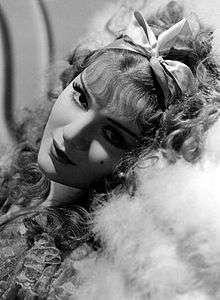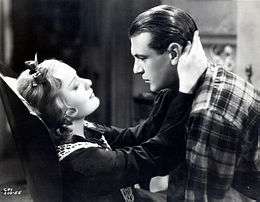Anna Sten
| Anna Sten | |
|---|---|
 Anna Sten publicity photo, 1934 | |
| Born |
Anna Petrovna Fesak December 3, 1908 Kiev, Kiev Governorate, Russian Empire |
| Died |
November 12, 1993 (aged 84) New York City, New York, U.S. |
| Occupation | Actress |
| Years active | 1926–64 |
| Spouse(s) |
Boris Sten (Bernstein) Fyodor Otsep (1927–1931) Eugene Frenke (1932–1984) |
Anna Sten (Ukrainian: Анна Стен; December 3, 1908 – November 12, 1993) was a Ukrainian-born American actress. She began her career in stage plays and films in Russia before travelling to Germany, where she starred in several films. Her performances were noticed by film producer Samuel Goldwyn, who brought her to the United States with the aim of creating a new screen personality to rival the popular Greta Garbo. After a few unsuccessful films, Goldwyn released her from her contract. She continued to act occasionally until her final film appearance in 1962.[1][2]
Early life and education
Anna Petrovna Fesak was born December 3, 1908 in Kiev.[3][4] There are other conflicting dates of birth: 1910 and 1906 from self-written dates in Application Forms from college. Also Anna's mother, Alexandra Fesak (Fissakova), listed Anna's birthdate as October 29, 1906 on her arrival in the United States. According to the official biography, her father was born into a Cossack family, worked as a theater artist and producer. Her mother was a Swede by birth and was a ballerina. In Kiev in the middle of the 1920s she married entertainer and variety actor Boris Sten (Bernstein), and took his stage name as her own.[5]
In most foreign sources her maiden names are Stenska and Sudakevich, or a combination thereof (such as a common variant Anel (Anyushka) Stenska-Sudakevich, Annel (Anjuschka) Stenskaja Sudakewitsch), which is why Anna Sten is often mistakenly identified with the Russian actress Anel Sudakevich that starred in Soviet cinema at the same time and with some of the same directors as Anna Sten. The actresses have often been confused for one another.[6]
Sten received her education at Kyiv State Theatre College, worked as a reporter and simultaneously played in Kiev Maly Theater, attended classes at the studio theater where she worked within the Stanislavsky System. In 1926 Sten successfully passed exams in the first working Proletcult theater in Moscow.[7]
Career
In 1926, after completing her studies at Kyiv theater school, Sten was invited by Ukrainian film director Viktor Turin to appear in his film Provokator, based on the book by Ukrainian writer Oles Dosvitnyi.[Note 1] Sten was discovered by influential Russian stage director and instructor Konstantin Stanislavsky, who arranged an audition for her at the Moscow Film Academy.[1] Sten went on to act in other plays and films in Ukraine and Russia, including Boris Barnet's 1927 comedy The Girl with a Hatbox. She and her husband, Russian film director Fedor Ozep, traveled to Germany to appear in a film co-produced by German and Soviet studios, Zemlya v plenu (Russian: "Earth in Captivity") and Der gelbe Paß (German: The Yellow Pass). After the film was completed, Anna Sten and her husband decided not to return to the Soviet Union.[1]

Making a smooth transition to talking pictures, Sten appeared in such German films as Trapeze (1931) and The Brothers Karamazov (1931) until she came to the attention of American movie mogul Samuel Goldwyn. Goldwyn was looking for a foreign-born actress that he could build up as the rival of Greta Garbo, and possible successor to Vilma Bánky, with whom Goldwyn had great success in the silent era. For two years after bringing Sten to America, Goldwyn had his new star tutored in English and taught Hollywood screen acting methods. He poured a great deal of time and money into Sten's first American film, Nana (1934), a somewhat homogenized version of Émile Zola's scandalous 19th century novel. But the film was not successful at the box office, nor were her two subsequent Goldwyn films, We Live Again (1934) and The Wedding Night (1935), playing opposite Gary Cooper. Reluctantly, Goldwyn dissolved his contract with his "new Garbo."[1][2] Goldwyn's tutoring of Sten is mentioned in Cole Porter's 1934 song "Anything Goes" from the musical of the same name: "When Sam Goldwyn can with great conviction / Instruct Anna Sten in diction / Then Anna shows / Anything goes."
In the 1940s, Sten appeared in several films, including The Man I Love (1940), So Ends Our Night (1941), Chetniks! The Fighting Guerrillas (1943), They Came to Blow Up America (1943), Three Russian Girls (1943), and Let's Live a Little (1948). Sten continued making films in the United States and England, but none of them were successful. Attempting to rectify this situation by studying at The Actors Studio,[3][8] Sten appeared in several television series during the 1950s, including The Red Skelton Show (1956), The Walter Winchell File (1957), and Adventures in Paradise (1959).
Later life
Most of Sten's later film appearances were favors to her husband. She had an uncredited bit in the Frenke-produced Heaven Knows, Mr. Allison (1957), and a full lead in her final film (also produced by Frenke), The Nun and the Sergeant (1962).
Sten died on November 12, 1993 in New York City at the age of 84.[2]
Personal life
Sten was married to film producer Eugene Frenke, who flourished in Hollywood after following his wife there in 1932.
Filmography
| Year | Title | Role | Notes |
|---|---|---|---|
| 1926 | Miss Mend | Typist (uncredited) | The Adventures of the Three Reporters |
| 1927 | The Girl with a Hatbox | Natasha | Moscow That Weeps and Laughs Devushka s korobkoy |
| 1927 | The Yellow Ticket | Maria | |
| 1928 | Moy syn | Olga Surina | |
| 1928 | Belyy oryol | Governor's wife | |
| 1929 | Zolotoy klyuv | Varenka | |
| 1930 | Lohnbuchhalter Kremke | Kremkes Tochter | |
| 1931 | Der Mörder Dimitri Karamasoff | Gruschenka | |
| 1931 | Les frères Karamazoff | Gruschenka | |
| 1931 | Trapeze | Marina | I Salto Mortale |
| 1931 | Bombs Over Monte Carlo | Königin Yola I. von Pontenero | Bomben auf Monte Carlo |
| 1932 | Storms of Passion | Russen-Annya | |
| 1934 | Nana | Nana | |
| 1934 | We Live Again | Katusha Maslova | |
| 1935 | The Wedding Night | Manya Novak | |
| 1936 | A Woman Alone | Maria | |
| 1939 | Exile Express | Nadine Nikolas | |
| 1940 | The Man I Married | Frieda | |
| 1941 | So Ends Our Night | Lilo | |
| 1943 | Chetniks! The Fighting Guerrillas | Lubitca Mihailovitch | |
| 1943 | They Came to Blow Up America | Frau Reiter | |
| 1943 | Three Russian Girls | Natasha | |
| 1948 | Let's Live a Little | Michele Bennett | |
| 1955 | Soldier of Fortune | Madame Dupree | |
| 1956 | The Red Skelton Show | Queen of Livonia | Television program |
| 1956 | Runaway Daughters | Ruth Barton | |
| 1957 | The Walter Winchell File | Frieda | Television program |
| 1959 | Adventures in Paradise | Antonia | Television program |
| 1962 | The Nun and the Sergeant | Nun | |
| 1964 | Arrest and Trial | Mrs. Van de Heuven | Television program |
See also
References
- Notes
- ↑ A newly restored version of Viktor Turin's film Provokator was shown at the Silent Films Festival in Pordenone, Italy in October 2012.
- Citations
- 1 2 3 4 "Anna Sten". Internet Movie Database. Retrieved November 2, 2011.
- 1 2 3 Pace, Eric (November 15, 1993). "Anna Sten Is Dead; Film Actress Touted As Another Garbo". The New York Times. Retrieved November 2, 2011.
- 1 2 Shipman, David (November 19, 1993). "Obituary: Anna Sten". The Independent. Retrieved December 8, 2012.
- ↑ "Anna Sten Biography". Turner Classic Movies. Retrieved October 16, 2014.
- ↑ "Anna Sten - Wikipedia Ukraine"
- ↑ "Anna Sten - Wikipedia Ukraine"
- ↑ "Anna Sten - Wikipedia Ukraine"
- ↑ Garfield, David (1980). "Appendix: Life Members of The Actors Studio as of January 1980". A Player's Place: The Story of The Actors Studio. New York: MacMillan Publishing Co., Inc. p. 280. ISBN 0-02-542650-8.
External links
| Wikimedia Commons has media related to Anna Sten. |
- Anna Sten at the Internet Movie Database
- Anna Sten at AllMovie
- Photographs and literature
- Anna Sten at Find a Grave
- Anna Sten Biography (in Russian)